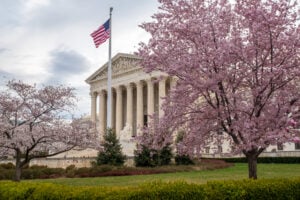Some Supreme Court Justices Cringed At Cases Involving Tax Law
Almost all of the Supreme Court justices have, at best, limited experience with tax laws.
 For most legal experts, tax law is, to put it mildly, an acquired taste. Maybe it is because of the numbers and having to put complex calculations into words. Or maybe it reminds them about the large amount that they either must pay or that is taken from their paycheck. Or the cases don’t involve instances of “I know it when I see it,” whereas the equally technical patent law is exposed to it from time to time.
For most legal experts, tax law is, to put it mildly, an acquired taste. Maybe it is because of the numbers and having to put complex calculations into words. Or maybe it reminds them about the large amount that they either must pay or that is taken from their paycheck. Or the cases don’t involve instances of “I know it when I see it,” whereas the equally technical patent law is exposed to it from time to time.
This aversion includes some Supreme Court justices as almost all of them have, at best, limited experience with tax laws.
The only justice known to have tax expertise was Harry Blackmun, who worked on tax cases when he was in private practice. As such, there is speculation that other justices may have deferred to Blackmun because they were not interested in tax law.

Is The Future Of Law Distributed? Lessons From The Tech Adoption Curve
There have been a few instances where justices have jokingly made their displeasure to tax law known.
Some have told acquaintances that they’d rather volunteer to wash windows than be assigned the opinion-writing chores in a tax case.
Justice William Brennan’s normal reaction to a cert request in a tax case: “This is a tax case. Deny.”
Chief Justice Rehnquist led the caroling at the Supreme Court’s Annual Christmas Party. Shortly before one such party, a newly appointed Justice David Souter encountered a law clerk who asked if he would sing. Souter replied, “I have to. Otherwise, I get all the tax cases.”
Sponsored

Is The Future Of Law Distributed? Lessons From The Tech Adoption Curve

Legal AI: 3 Steps Law Firms Should Take Now

The Business Case For AI At Your Law Firm


The Business Case For AI At Your Law Firm

In the past, getting a tax case seemed to be a punishment.
According to Blackmun, if one was in the doghouse with Chief Justice Warren Burger, he got the crud. This meant getting the tax cases. And some of the Indian cases.
Justice Lewis Powell mentioned that during his tenure in the court, then Chief Justice Rehnquist was fair in allocating opinion-writing duties in cases the justices call “dogs.” He said, “A dog is a case you wish the Chief Justice had assigned to some other Justice. A tax case, for example.”
He also said that during a “lofty legal discussion” with Justice Thurgood Marshall about a boring tax case, Marshall leaned over to Powell and jokingly said, “You can have my vote on this for a future draft pick.”
Some Supreme Court scholars believed that Marshall got assigned tax cases because he was given nothing better to do. He was a liberal justice working under two conservative chief justices. It should be noted that Marshall wrote the majority opinion in Cottage Savings Association v. Commissioner, which was the most recent case where the Supreme Court discussed what is a realization event for tax purposes. Blackmun the tax expert wrote the dissenting opinion. The realization event will be discussed again when the Supreme Court decides Moore v. U.S.
Sponsored

How Transactional Lawyers Can Better Serve (And Maintain) Their Clients

Generative AI In Legal Work — What’s Fact And What’s Fiction?

So far, it is unclear whether any of the current Supreme Court justices share the views of a few of their predecessors. If they did, I don’t blame them. While the anecdotes are amusing, if their aversion to tax law results in the court constantly deferring to agency expertise, it may result in a decision that is unfair to the taxpayer and not intended by the legislature.
(Gavel Bang: Jack Townsend’s Federal Tax Procedure Blog)
Steven Chung is a tax attorney in Los Angeles, California. He helps people with basic tax planning and resolve tax disputes. He is also sympathetic to people with large student loans. He can be reached via email at stevenchungatl@gmail.com. Or you can connect with him on Twitter (@stevenchung) and connect with him on LinkedIn.







